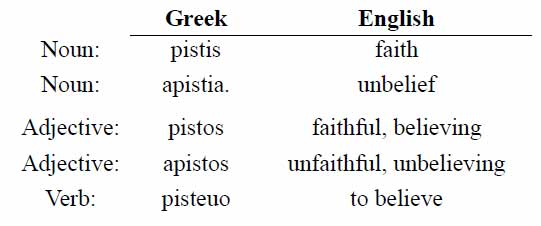
There are Christian books and teachings out there which say that the Greek word pistis is best translated as “faithfulness” or “allegiance.”
If this is true, then rather than eternal life being gained by believing in Jesus for it (and not by works of any kind), eternal life is instead gained by living a life of faithful obedience and allegiance to Jesus.
But is eternal life gained by allegiance to Jesus? No. This is a gospel of good works, which is no gospel at all.
Indeed, I believe that there is not a single use of the Greek word pistis in the New Testament which is properly translated as “faithfulness.”
Yes, The BDAG Greek lexicon does list six verses where pistis can be translated as “faithfulness,” but not all English translations of these passages translate it in such a way.
In fact, “major contemporary English versions translate pistis as ‘faithfulness’ or ‘fidelity’ in only three or four New Testament verses” (Brindle, “Faith in Christ Does Not Mean Faithfulness or Fidelity“). And even in these three or four verses, pistis could arguably be translated as “faith” (Matt 23:23; Rom 3:3; Gal 5:22; Titus 2:10).
Let me show you why this is so, and then we will consider a sample verse from Scripture which helps illustrate this view.
Note: The following is drawn from my book, (#AmazonAdLink) What is Faith?
Faithfulness vs Faith for the Greek pistis)
For numerous reasons, it does not seem best to understand the word “faith” (Gk., pistis) as “faithfulness.”

While there does initially seem to be some evidence for this understanding in various biblical and extra-biblical contexts, such a view opens the door for a works-based approach to gaining, proving, or keeping our eternal life, and so should be rejected.
After all, if pistis can sometimes refer to allegiance, loyalty, or ongoing obedience, then there is nothing to stop someone from saying that most references to faith in the New Testament carry this idea, and therefore, eternal life is not gained by simply believing in Jesus for it, but instead by living loyally and obediently to Him.
This is indeed what some argue (see, for example, Michael Bates, (#AmazonAdLink) Salvation by Allegiance Alone).
Yet once we properly understand that faith is a conviction or persuasion that something is true, we are then positioned to better understand the various texts in English Bibles which translate pistis as faithfulness (Matt 23:23; Rom 3:3; Gal 5:22; Titus 2:10).
When studied in their contexts, we see that these controversial passages do not require for pistis to refer to loyalty, allegiance, or ongoing obedience, but could instead refer to a persistent and ongoing faith.
Faith is like a light switch. When it comes to the various truths we can believe, faith is either “On” or “Off.” If it stays “On” for a long time, then it is persistent faith.
Not all beliefs stay “On” all the time. We often change our beliefs due to new evidence that is presented to us. Sometimes we change our beliefs as we learn more about God through Scripture and in fellowship with other believers.
In such instances, we turn away from falsehood and embrace the truth, so that our network of beliefs comes to more closely match what is actually true.
We can also stray from the truth and fall into dangerous and unhealthy teachings. It is not uncommon for true believers to fall prey to false teaching so that they come to deny the truth and turn instead toward lies and deceptive ideas.
But as long as a Christian maintains a belief in what is actually true, their belief is persistent. This persistent faith is which Scripture invites us to strive and long for.
Therefore, the texts that seem to require a translation of “faithfulness” are not referring to allegiance and obedience, but to this ongoing and persistent faith. It is a faith that remains.
The “Faithfulness of Jesus” is His Ongoing, Persistent Faith
 This is even true when the Bible refers to the faith of God or the faith of Jesus.
This is even true when the Bible refers to the faith of God or the faith of Jesus.
It is not necessary to understand these texts as referring to the faithfulness of God or the faithfulness of Jesus.
Since faith is the knowledge, conviction, or persuasion that something is true, then it is obvious that both God and Jesus can have faith.
Indeed, the Trinitarian God is the only being in the universe who has perfect faith.
All other beings in the universe do not have perfect knowledge of all things, and therefore, do not believe or know all things. Only God’s faith is eternally perfect and persistent.
Since faith or belief is the conviction that something is true, God knows everything that is true, and therefore, believes it and will always believe it.
Furthermore, He even has faith toward us. He knows what is true about us, even when we do not (Rom 3:3-4). He also knows what will be true about us, and He speaks these things to us so that we might be inspired by His testimony toward us to believe these things as well.
God wants us to live as He sees us; not as we see ourselves. God believes in us and invites us to believe in Him so that together, our belief will bring God’s vision of the future into reality.
Faith vs. Faithfulness in Tricky Bible Texts
This understanding helps clarify some of the tricky texts which seem to require “faithfulness” as a translation of pistis.
Such texts do not refer to allegiance or ongoing obedience, but to an ongoing and persistent belief.
And this belief can lead to other beliefs as well. For example, once we have believed in Jesus for eternal life, this does not mean that faith has no more place in the life of the believer. Just as we have received Jesus Christ, so also we must continue to walk with Him (Col 2:6). And how is it that we received Jesus? By faith. So we are to continue our life with Him by faith as well.
This is not only true because ongoing faith gives us the best life possible with Jesus, but also because other truths we can believe depend on continuing to believe previous truths.
Remember that all of our beliefs are interconnected like a vast Excel spreadsheet.
Many of the more advanced truths and ideas on this spreadsheet will not be discovered and cannot be believed unless we maintain our belief in some of the earlier, foundational truths.
In other words, future faith builds upon our former faith. Believing simple and elementary things allows us to later believe more difficult and hard things.
This is what Paul means when it talks about going from “faith to faith” (cf. Rom 1:17) and when he refers to faith as a fruit of the Spirit (Gal 5:22). As we walk with God in faith and by the Spirit, we grow in our faith and come to believe things that draw us closer to God and make us more like Jesus.
So regardless of which stage of faith we are talking about, faith does not involve ongoing obedience.
Faith does not begin with simple belief and then end with allegiance and loyalty.
There are no works in faith, for faith is the opposite of works. While faith can lead to works, the presence or absence of works do not necessarily indicate anything one way or another about a person’s faith.
In all cases, faith is simply being persuaded and convinced about what we have been told.
When we believe in Jesus for eternal life, we are persuaded that Jesus, as the author and finisher of our faith, loves us, forgives us, and freely grants eternal life to us, not because of anything we have done but simply and only because of God’s grace toward us.
No commitment to allegiance or ongoing obedience are required.
Therefore, the word pistis is not ever properly translated as “faithfulness.”

Faith vs. Faithfulness in Titus 2:10
Of the various passages that sometimes use the word “faithfulness.” as a translation of pistis (Matt 23:23; Rom 3:3; Gal 5:22; Col 2:6; Titus 2:10), I have already briefly considered Romans 3:3, Colossians 2:6, and Galatians 5:22 above.
In Matthew 23:23, the NKJV properly translates the Greek as “faith,” so let us consider the final text, Titus 2:10, here.
The first thing to note about Titus 2:10, is that it fits within the broader context of Titus 2. And Paul begins in Titus 2:1f by telling Titus to teach and encourage others to have sound doctrine and godly practices. In other words, Titus is to call others to proper beliefs and behavior.
And then Paul goes through various categories of people among whom Titus ministers. He gives instructions for older men (Titus 2:2), older women (Titus 2:3), young women (Titus 2:4-5), young men (Titus 2:6-8), and servants (Titus 2:9-10).
In each case, Paul encourages the various groups to watch their life and doctrine closely … that is, their beliefs and their behaviors. As for the beliefs, the older men are to be “sound in faith.” The older women are to be “teachers of good things.” The younger women are to be careful not to blaspheme the word of God. The younger men are to have integrity in their doctrine.
The bondservants are to have “good fidelity,” which is the controversial phrase. I propose it should be translated as “good faith” (as in the NAS).
Three lines of argument from the context show that this should be translated as “good faith” instead of “good fidelity.”
First, the word pistis is already used in the context. At the beginning of this section when he gives instructions to the older men, and most English Bibles translate this word as “faith.” The use of the same word here at the end of this section creates a nice frame for the entire section. By using pistis at both the beginning and end, Paul shows that he desires both proper beliefs and proper behaviors from all.
And since pistis is best translates as “faith” in Titus 2:2, then it seems that it should also be translated as “faith” in Titus 2:10.
Support for this idea is found in the next phrase of Titus 2:10, where Paul goes on to write about the doctrine of God our Savior. This is the second reason “faith” is the best translation for pistis in Titus 2:10. The following phrase refers to doctrine.
What are you to do with doctrine, or theology, other than believe it? Doctrine is taught so that it can be believed.
Thirdly and finally, then, we know that Paul does not mean “faithfulness” or “fidelity” with the word pistis in Titus 2:10, because he has been referring to beliefs and behaviors of all the various groups of people throughout this passage. If the reference to pistis in this verse also refers to allegiance, fidelity, or faithful obedience, then Paul’s instructions to the servants is only about their behavior and not about their beliefs at all.
But shouldn’t servants also have proper beliefs? Of course they should! And just as Paul encourages the previous four groups of people to have good beliefs and good behaviors, he gives similar instructions to this final group, the servants. The word pistis must refer to the beliefs of the servants, while all the preceding terms refer to their behaviors.
Conclusion
It is not helpful to translate pistis as “faithfulness, allegiance, or fidelity” in any passage in the Bible. When Scripture wants to use terms for obedience and dedicated allegiance, it has good words to use in those cases.
But pistis always refers to faith or belief, and includes no actions or obedience whatsoever.
Don’t allow good works to sneak in the back door of the gospel by thinking that pistis can sometimes refer to faithfulness or ongoing obedience. Such a gospel is no gospel at all, for if we receive eternal life by ongoing, faithful obedience to God, then no person would ever receive eternal life, for no person can ever be “faithful” enough.
Thankfully, good works do not help us earn or keep the free gift of eternal life. It is freely given by God’s grace to anyone who simply and only believes in Jesus for it.
Get my book, (#AmazonAdLink) What is Faith? to learn more about faith.
 Understanding the Gospel requires us to properly understand the key words and terms of the Gospel. Take my course, "The Gospel Dictionary" to learn about the 52 key words of the Gospel, and hundreds of Bible passages that use these words.
Understanding the Gospel requires us to properly understand the key words and terms of the Gospel. Take my course, "The Gospel Dictionary" to learn about the 52 key words of the Gospel, and hundreds of Bible passages that use these words.
This course costs $297, but when you join the Discipleship group, you can to take the entire course for free.




Jeremy, I posted this on FB under your video but then saw that you are no longer live and wanted new posts put here. So here goes: The Greek word pistis is mistranslated in nearly every place that it occurs in the NT in every English Bible translation that was ever made. There are a few places where it would be proper to translated it as faithfulness or allegiance or, better yet, loyalty because pistis is a relationship term. Also, it may interest you to know that the English word “faith” is a corrupt word that should not even be in our English Bibles because it’s not the English equivalent of any Greek word—especially not pistis. Technically speaking, pistis is the noun form of pisteuo, which is a verb that means “to believe.” Therefore, it would seem that pistis should be translated as “belief,” but Bible translators have avoided this option because belief doesn’t fit the context. (I think the KJV translators used it one time.) So, this creates a problem for Bible translators and especially Bible readers because of how important and fundamental pistis is to our salvation and to our relationship with God. In other words, faith, or rather, pistis is a mystery!! The apostle was so right when he referred to “the mystery of . . . faith [pistis] in his first letter to Timothy. This is why there is so much confusion, misunderstanding, and disagreement among believers over this term.
I’m super interested in this topic…but I don’t know how to express what I’m trying to say lol. I read all of your thoughts on the Facebook page and kinda agree with you and Jeremy. Nope…there’s not a difference between “head faith” and “heart faith” in the Bible. However, there does seem to be a difference between acknowledging facts about something and being persuaded by those facts or convicted by those facts. Anyway…I look forward to being a part of the discussion. Thanks for your comments, Tom!
You’re welcome, Cody! Thanks for replying to my comment and sharing your thoughts. In a subsequent comment on Jeremy’s FB page, I mentioned that the focus of our belief (which would also be true of our faith) is a PERSON (Christ Himself and His redemptive work of dying on the cross for our sins), not a THING (eternal life or the promise of eternal life). This also applies to FACTS. Acknowledging certain facts about Christ or even being persuaded or convicted by those facts is not sufficient for us to be regenerated because facts are nothing more than information, and there is no life in information. Such information can even move us and cause us to weep, lament, etc., but those effects are not necessarily produced by life (that is, the life of Christ in the Holy Spirit) but can be produced by our own minds when our minds encounter and process such information.
A perfect example of this would be an article or book that contains a graphic description of what Jesus went through when He was whipped and then subsequently crucified. These same scenes in “The Passion of the Christ” movie that Mel Gibson produced were very graphic and caused intense emotional reactions in some if not many of the people who watched the movie. But these scenes are merely a re-enactment of an historical event, and, as such, are not sufficient in themselves to cause a person who watches or reads about them to be regenerated. Instead, that person must have an encounter with Christ Himself through the Holy Spirit (who is responsible for revealing Christ to us) in order for him or her to experience the life that produces regeneration. Of course, the facts about Christ’s death on the cross can have an important role in this process. But those facts are insufficient in themselves. Besides, I know of people who have been regenerated without those facts playing any role, although that is not necessarily a common occurrence these days.
But the main point of what I’m saying by all of this is that we need to recognize the difference between the role of information about Christ and the role of revelation that the Holy Spirit uses in conjunction with that information to introduce us to the person of Christ Himself. Information can fill our minds and can even move our emotions and wills, but only revelation can reach deep within to our hearts and cause us to be made alive in Christ with the result that we become children of God.
Good stuff, Tom. Would you say that ” Instead, that person must have an encounter with Christ Himself through the Holy Spirit (who is responsible for revealing Christ to us) in order for him or her to experience the life that produces regeneration” this is what the Bible calls “belief” or to “believe”?
I totally agree with His Word that “whosoever believes” (John 3) but I’ve always felt the need to add something to that belief…meaning, it at least seems like a different belief other than acknowledging that facts are true. I know this is what Jeremy is trying to avoid (I’m still up in the air).
I think it might be similar to conviction over sin. Before I was a Christian, I knew things were wrong (a.k.a. sin). I knew my addiction to gambling was wrong and hurtful, etc. However, after by “whosoever” encounter with Jesus, knowing those things were wrong became different. It was a different acknowledging of the facts of sin.
I’m not sure if that makes any sense…I’m just trying to put my finger on what I belief about believe!
Cody, our encounter with Christ through the Holy Spirit is what enables us to believe. Think about the apostle Paul’s encounter with Christ when he was Saul on the road to Damascus. A light that was brighter than the sun surrounded him from above, and then a voice said, “Saul, Saul, why are you persecuting Me?” Saul replied, “Who are You, Lord?” and Jesus said, “I am Jesus whom you are persecuting.” Now here is the key to the whole issue of believing: Jesus then said, “It is hard for you to kick against the goads.” In other words, Saul was doing his best to reject the light but had a hard time doing so because it was so intense. However, we know that Saul eventually did receive that light and became one of Jesus’ followers. But he never would have done so without this encounter (or some other intense encounter) because of his zeal for the religion of Judaism.
The same thing is true of everyone else who has become a follower of Jesus. They had to have an encounter with Him or they would not and could not have “received the light” which is the same as believing (to believe is to receive). Of course, not everyone who has an encounter does receive/believe in Him. But no one can become a follower of Jesus without some kind of encounter with Him. This is very different from an “encounter with” or exposure to certain facts about Christ. Saul had heard the claims that Jesus’ followers had made about Him being the Messiah and about Him dying for our sins and rising from the dead, which were indeed facts. But those facts never became reality to Saul until He actually met the risen Christ. Likewise, those facts can never become reality to anyone else who hasn’t actually met the risen Christ through the Holy Spirit.
The same is true of our sins. It’s one thing to be taught by our parents or by other people that certain things we do are sins. But when the Holy Spirit convicts us of our sins and shows us our need of Christ so that our sins can be forgiven, it’s a very different matter. In a nutshell, it’s a mind vs. heart issue. Only the Holy Spirit can convict the heart of sin. Having a mental awareness of sin because of being told or taught that certain things we do are sins is not the same as conviction. And just as mental awareness of sin goes hand in hand with a mental understanding of facts about Christ, heart conviction of sin goes hand in hand with a heart encounter with Christ. Someone who has the first two will only be able to “believe” with their minds, which will result in a false conversion to Christ. On the other hand, someone who also has the second two will be able to believe with their minds and with their hearts, and that will result in a genuine conversion to Christ.
*It looks like we ran out of “replies” to our thread…so I’m jumping back up here.
Tom, I don’t necessarily disagree with anything you’ve said. I’d just like to maybe use a different example to make sure I totally understand. Paul’s encounter is pointed to often…but it doesn’t seem to be the “norm”.
What are your thoughts about the Ethiopian Eunuch in Acts 8? He seems to have understood the information…believed it…and was baptized. No lights. Seemingly no sorrow. Nothing dramatic. No display of the Holy Spirit. Only an understanding of the scripture and a belief.
Excellent question, Cody. Considering the fact that the Ethiopian eunuch had just come from Jerusalem from where he had gone to worship, I doubt that he was not aware of many of the things that had been happening there during the last few years since Jesus began His ministry, etc., because he would have heard about those things during his visits to Jerusalem. However, unlike Cornelius the Centurion in Acts 10 (who was a God-fearing Roman, but not a Jew), the Ethiopian eunuch probably wouldn’t have been as familiar with those things because of how much farther Ethiopia is than Ceasarea is (where Cornelius lived) from Jerusalem. But his advantage over Cornelius is that, like all the other Jews of that day, he would have been looking for the arrival of the Messiah. So, for him, all that was needed was someone like Philip to “connect the dots” and for him to do so in the right place at the right time because the limited amount of info in this passage suggests that the eunuch’s heart was ripe and ready to hear and receive not only the truth about Jesus but also Jesus Himself.
If you read through the book of Acts and examine every passage in which the gospel was preached, you’ll discover that Luke doesn’t describe every conversion that took place in exactly the same way. In fact, you should notice lots of differences in the terms he uses from passage to passage because nearly every situation was unique. So, Luke only included enough information to express what was necessary for each situation without going into extensive detail every single time.
I love what you just wrote.
without the revelation that only comes from God, it’s just head knowledge.
Given English speakers [incorrectly] use faith & belief as synonyms, this explanation just kicks the can.
We are not saved by “ideas in our head”. Any English translation which gives people the understanding being a Christian is about having ideas in their head cannot be correct.
Salvation (or eternal life) only has to do with being a child of God. It’s the same as with our children. Of course we want them to obey, for their own good, but they fail over and over again, and get hurt by that. We never love them (or not) because they follow orders (or don’t). Has nothing to do with faithfulness or loyalty on their part. We love them because they are our children. It’s the same with God, except that He is perfect, and we are not.
I agree that if eternal life depends on our faithfulness then it is by OUR WORKS.
I like how Romans 1:17 puts it: “This Good News tells us how GOD MAKES US RIGHT in his sight. This is accomplished from start to finish by faith.”
This clarifies for me that we can’t do anything to make ourselves right with God.
All we can “do” is just ACCEPT what He has already provided.
Very interesting how the Contemporary English Version translates Jude 1:1 – “… To all who are chosen and loved by God the Father and are KEPT SAFE BY JESUS CHRIST.”
This clarifies for me that I don’t keep myself safe by my faithfulness.
In fact, 2 Timothy 2:13 says: “If we are unfaithful, he remains faithful, for he cannot deny who he is.”
How can faith in the King not imply allegiance to the King?
It all depends on what they are believing in the King for. If they believe in the King for eternal life, then allegiance is not part of that faith. But if they believe in Him to lead and guide them, then yes, allegiance will be required.
I am NOT saying we shouldn’t have allegiance to Jesus. We should. I am just saying that “allegiance” is not a good translation of pistis. Numerous other concepts and passages in Scripture call us to obedience and allegiance to King Jesus. So let’s use those.
Why is the reformed sect so adamant that the Christian is only required to have head knowledge of the gospel and not live it out? That is very suspect to me, and it seems likely they are following in the footsteps of the antinomian womanizer Luther, who, convicted about his lifestyle being incompatible with the teachings of Christ, tried to bend the Bible to expurgate faithfulness from the Christian life.
The just shall live by faith. Pistis.
There is another being that believes in Him but doesn’t show obedience or loyalty to Him. Honestly telling people the same kinda things you have said.
This is a completely circular argument. You’ve already interpreted “pistis” to mean “ideas in my head” & then you look at passages which strongly indicate this is a bad translation because they make it clear pistis is something you do, not something you think & you then have to argue “faithfulness is a bad translation because salvation is by ‘pistis alone’ which I’ve already decided means ideas in your head”.
You might be able to make it seem like it sticks with Titus 2, but there are quite a lot of places in Saint Paul’s epistles it is impossible to get away from his comparison of depraved behavior & “faith” which makes no sense if “faith” is “ideas in your head” & you basically have to bin Saint James’ epistle entirely because “ideas in your head” makes total hash of what he’s saying.
Maybe start with what seems like the most natural translation & then decide what doctrines & practices express that understanding rather than making a sacred cow of a doctrine & then shoehorning it backward into the texts.
Well, if you were in a covenantal marriage with your spouse, then pistis as a non active form of faith would make for a terrible marriage. But, pistis as a faithful relationship, whereas action occurs, is a healthier union.
This sounds like bad theology. 2 thumbs down.